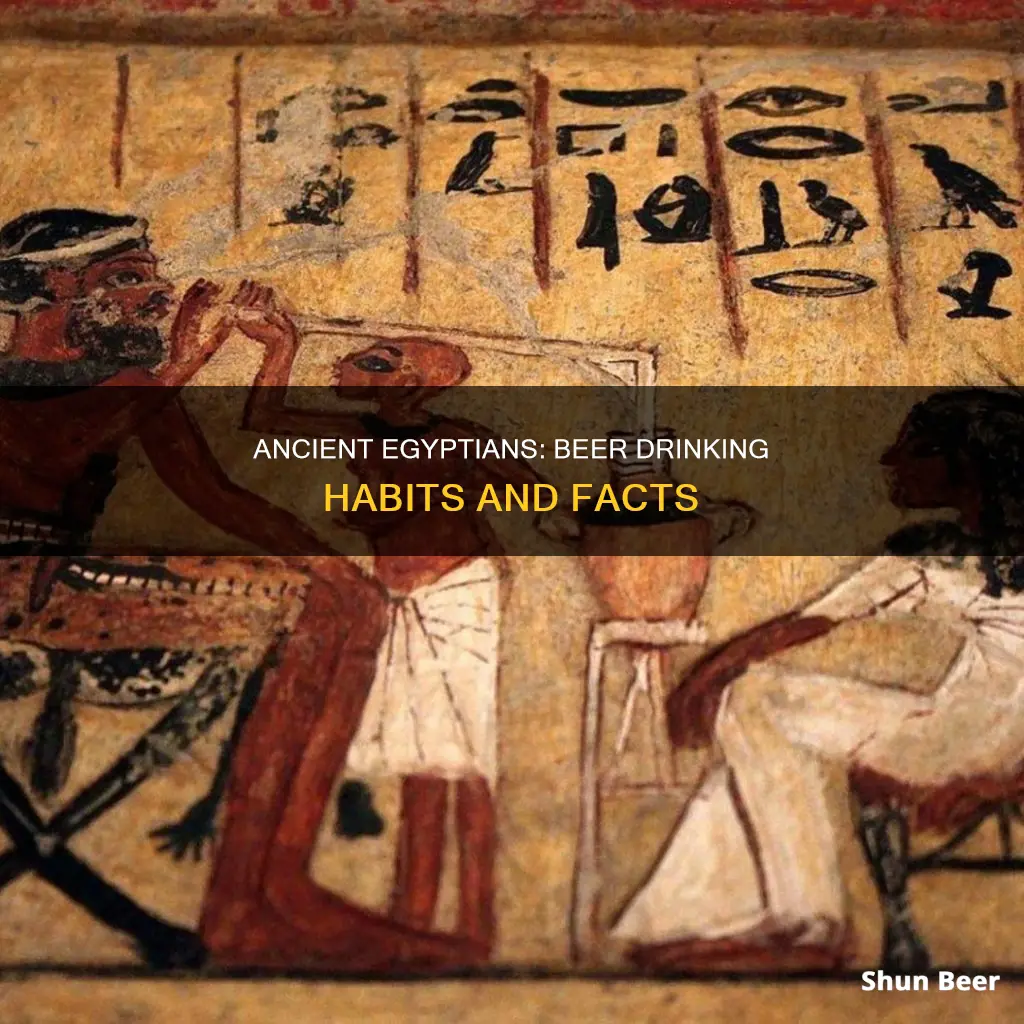
The Ancient Egyptians were serious beer drinkers. They consumed it in huge volumes, and it was considered a source of nutrition for men, women, and children alike. Beer was also used as payment for manual labour, and it was used as medicine to treat various ailments. The Ancient Egyptians even had a whole festival dedicated to beer, called the Festival of Drunkenness.
The Ancient Egyptian brewing method is far simpler than contemporary techniques. They used a two-stage mash process, which involved mixing grain with cold water and hot water separately, and then combining the two mixtures. This allowed for the conversion of starches to sugars, and the mixture was then left to ferment in a terracotta vessel. The beer was consumed straight from the vessel using a straw.
So, how much beer did the Ancient Egyptians drink? A lot!
What You'll Learn

The Ancient Egyptian brewing process
The mixture was then sieved to remove any residual grain, and the liquid was poured directly into a terracotta fermenting vessel, which had been pre-inoculated with a harvested yeast strain. More warm water was used to rinse the remaining starches and sugars from the grains. The vessel was then covered with a muslin cloth and left to ferment. The beer would have been drunk while still actively fermenting from the ceramic vessel itself.
The terracotta vessel was key to the ancient Egyptian fermenting process. Its porous interior provided the ideal surface for the wild yeast culture to grow, and its coolness to the touch was an advantage in the hot, arid climate. The beer was drunk using a straw, likely made from clay, to prevent the consumption of sediment and for hygiene, as many people would have drunk from the same vessel.
The ancient Egyptians did not use hops, as these were not cultivated until the medieval period. Instead, they added dates and herbs to add sweetness and depth of flavour. They also added honey to increase the alcohol content.
Beer Consumption: How Much Do People Drink Annually?
You may want to see also

Beer as a food source
Beer was a staple food source for the ancient Egyptians, who consumed it in huge volumes on a daily basis. It was considered a source of nutrition and was regularly used as compensation for labour. Workers at the Giza plateau, for example, received beer rations three times a day as payment. Beer was also frequently prescribed for medicinal purposes, with archaeologists discovering over 100 medicinal recipes from ancient Egypt that used beer as an ingredient.
The ancient Egyptians believed that the god Osiris gave them the knowledge to create beer, so it became an object of religious worship. Beer was consumed during religious festivals and celebrations, such as the Festival of Drunkenness, and was also used as an offering to the gods. It was considered a divine drink, with several goddesses associated with it, including Hathor, the goddess of love, dance, and beauty, who was also known as 'The Lady of Drunkenness'.
The ancient Egyptian brewing process was quite different from modern techniques. They used a two-stage mash process, with a cold mash made from ambient-temperature water and malted, ground grain, and a hot mash made from ground, unmalted grain mixed with hot water. These two mashes were then combined and left to cool, allowing the enzymes to convert the starches into fermentable sugars. The mixture was then sieved and placed in a terracotta fermenting vessel, which had been pre-inoculated with a yeast strain. More warm water was added to rinse remaining starches and sugars from the grains, and the vessel was covered with a cloth and left to ferment. The beer would have been consumed while still actively fermenting directly from the ceramic vessel.
The ancient Egyptian brew was a thick, dark red liquid that had to be filtered through a straw before drinking. It was made from fermented wheat and barley, and sweetened with dates and honey. It is believed that the alcohol content of this beer was relatively low, and it tasted more like a fruit drink than modern beer, with a hint of funk from the yeast profile.
Beer Basics: Middies and Standard Drinks Explained
You may want to see also

Beer as medicine
Beer was frequently used as medicine by the ancient Egyptians. It was prescribed to treat a variety of ailments, including stomach problems, coughs, and constipation. Archaeologists have discovered over 100 medicinal recipes from ancient Egypt that used beer as an ingredient. Beer was also thought to bring joy to the drinker and confuse evil spirits, which were considered the cause of many diseases.
The ancient Egyptian brewers' product was immensely popular, and beer was consumed by men, women, and children alike. It was considered a source of nutrition and was often used as payment for labour. The average beer had an alcohol content of 3-4%, while those used in religious festivals or ceremonies had a higher alcohol content and were considered better quality.
The ancient Egyptians believed that the god Osiris had given them the knowledge to brew beer, so it became an object of religious worship. Beer was also offered to the gods and included as burial offerings for the wealthy.
The brewing process for ancient Egyptian beer was quite different from modern techniques. It involved a two-stage mash process, with a cold and hot mash mixed together and left to ferment in a terracotta vessel. The beer was often flavoured with dates, honey, and various herbs and spices.
Coffee and Beer: Mixing Drinks, Safe or Not?
You may want to see also

Beer as a religious offering
Beer was an integral part of the ancient Egyptian diet, and it was also central to their religious practices. The ancient Egyptians believed that the god Osiris gave them the knowledge to brew beer, so it became an object of religious worship. Beer was considered the "drink of the gods" and was used in religious rituals. Temples would brew their own beers and offer them to the gods.
The Festival of Drunkenness, or the Tekh Festival, was a popular festival dedicated to Hathor, the goddess of love, dance, and beauty, also known as the "Lady of Drunkenness". The festival commemorated the story of Hathor's transformation into the savage avenger Sekhmet, and her subsequent return to her original form. Participants in the festival would drink to excess, fall asleep in a hall, and then be awakened by the beating of drums. The alcohol was believed to lessen people's inhibitions and allow them to glimpse the goddess.
The ancient Egyptians also included beer as burial offerings for the wealthy. It was considered a necessary offering for the dead, and jars of beer were placed in tombs. Beer was also believed to have medicinal properties and was frequently prescribed for various ailments. It was thought to "gladden the heart" and confuse evil spirits, which were considered the cause of many diseases.
Czechs and Beer: A Cultural Drinking Affair
You may want to see also

Beer as payment
Beer was a staple of the Egyptian diet and was also used as a form of payment. It was commonly used as compensation for manual labour, with workers at the Giza plateau, for example, receiving beer rations three times a day as payment. Beer was also used as medicine, appearing in over 100 medicinal recipes from ancient Egypt. It was believed to treat stomach ailments, coughs, and constipation.
Beer was considered a source of nutrition, not just an intoxicant, and was consumed by men, women, and children alike. It was also believed to be safer to drink than water. The average beer had an alcohol content of 3-4%, while beer used in religious festivals or ceremonies had a higher alcohol content and was considered to be of better quality.
The ancient Egyptians placed great importance on enjoying life, and their skill in brewing beer was renowned, even eclipsing that of the Sumerians, who were the actual inventors of the process. The Greeks, for example, wrote about Egyptian brewing skill while largely ignoring the Mesopotamians. Egyptian beer was also considered to be the ''first beer' in the world, as it had more in common with modern-day brews than Mesopotamian recipes.
The ancient Egyptians believed that the god Osiris had given them the knowledge to create beer, so it became an object of religious worship. Beer was mentioned as part of almost every major festival and was often supplied by the state. There was even a festival dedicated to beer called the "Festival of Drunkenness," which was dedicated to the goddess Hathor.
Breastfeeding and Beer: Is One Drink Okay for Baby?
You may want to see also
Frequently asked questions
The Ancient Egyptians drank beer in large quantities. It was a staple of their diet and was considered a source of nutrition. It was also used as a form of payment and medicine.
The Ancient Egyptians drank beer daily and in great quantities during religious festivals and celebrations.
Yes, men, women, and children drank beer.
Yes, the Ancient Egyptians were known to get drunk. They had a "Festival of Drunkenness" and there are accounts of people vomiting from overindulgence in alcohol.







